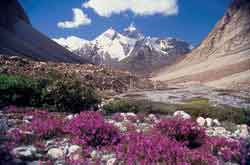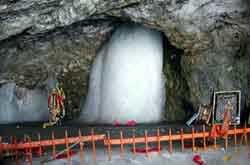Promoting Private Sector
An article by M. Ashraf, former Director General of Tourism, Jammu & Kashmir
Tourism is considered to be the largest export industry in the world. However, this industry can have an impact on the economy only when it has the motivational force of the Private Sector. Being a service oriented industry it requires professionalism and dedication which are generally lacking in the Public Sector especially in our part of the world. In the initial stages when tourism was just picking up, the state had to intervene. Private capital would be hesitant in investing without being sure of returns. To give a push to the activity it was essential for the government to go for infrastructure development. A lead was given to the industry and the public sector activities were in fact started totally as part of the department of tourism. It was like facilitating and motivating the private entrepreneurs to take up this activity. The annual expenditure on maintenance of various establishments run by the government in the shape of huts and tourist bungalows was over Rs.1.50 crores but the total revenue generated was hardly Rs.30 lakhs per year. These establishments were also run as a healthy competition to private sector to keep the prices of these services in check.
The greatest mistake was turning over all these establishments in one go to state run tourism development corporation. In almost all major tourist destinations, the infrastructure for accommodation, food, transport, and recreation is run by the private sector. The government has only to take care of the very basic infrastructure such as road connectivity, power, water, and communications. It has been proved everywhere that any commercial venture run by the government invariably ends in the red. There are many reasons for this. Firstly, the government service is taken more or less as social security. Employees cannot be fired even if their contribution is zero. The hire and fire system cannot be enforced in government due to a number of reasons. On the contrary in the private sector one has more flexibility both in the selection of the professional staff and policy of hire and fire can be enforced with some minimum guarantees. Apart from tourism, almost all other government corporations are in red. If we have to aim for development of international tourism, we have to promote private sector in a big way. In fact, the state sector organisations should also be gradually dis-invested. To begin with some of the lucrative properties should be put up for joint ventures.
Many attempts have been made in the past in this regard but most of these have failed as only loss making properties were offered for joint ventures or outright dis-investment. In addition, the procedures were made so complicated that every enterprising investor got fed up and ran away. The government has to take a conscious decision and plan it properly. Something like a golden handshake has to be worked out for the staff and their consent obtained. Any ad hoc measure is bound to recoil. These days specialist agencies are available for such jobs. Once it has been sincerely decided that the private sector has to be promoted, a number of substantive incentives have to be provided to attract investment. The present incentive rules initiated in mid nineties do not come up to the mark. At the time of declaring these incentives the main motive was to accede to the popular demand of declaring tourism as an industry. This was done with least financial commitment in view of the bad financial position of the state at that time.
Even though tourism was declared to be a priority industry yet the important incentives such as on power were not made available to this sector. It was declared an industry in name only. The first requirement would be to revise these incentive rules and make investment in tourism related infrastructure most attractive for both local as well as international investors. Not many people know that there are already a host of incentives available as part of the central industrial policy for various tourism projects. Most of the incentives are for Eco-Tourism projects, which is the most suitable activity for our state having a fragile environment. Lack of knowledge among the members of the trade as well as the administrators is making the local entrepreneurs lose these incentives by default! All tourism ventures should be given a complete tax holiday at least for ten years to motivate the private sector. There should be no bar on the location of these units provided these are in conformity with all local laws. Preference should be given to joint ventures involving local entrepreneurs and also ensuring substantial local employment in such projects. One often hears about single window clearance but it is never implemented on ground.
People coming for investments in any field have to spend months and sometimes years to obtain various clearances. The ideal situation can be setting up of a Tourism Investment Board with private/public sector participation to ensure clearance of projects at an accelerated pace. The areas for investment are extensive. To begin with is the world class accommodation in the major cities like Srinagar and Jammu. Many global hotel chains can be motivated for giving local franchise with government facilitation and if necessary, a counter guarantee in view of the prevailing circumstances. In fact, totally new resorts can be developed by professional developers and made available for sale among locals who have enough resources for making sizeable investments in this field. Next comes transport. We are nowhere near the minimum world standards. Avis and other rent a car brands which are already in some metros have yet to arrive here. We do not have luxury cars and coaches for sight seeing. Even though over last couple of years locals have taken some initiatives in regard to cars, yet the coaches of the Volvo brand are missing from Kashmir.
There has always been a persistent complaint about lack of recreational and entertainment facilities. We need not always go for night clubs and casinos but there are plenty of other recreational facilities which are missing. These could include bowling alleys, indoor ice and roller skating rinks, amusement parks, cable cars with mountain top panoramic restaurants, theatres, standard art galleries, and museums. There are umpteen other possibilities for decent avenues of entertainment. Unfortunately, instead of promoting private investment, the government is itself venturing into these projects thereby creating some more liabilities for future. It is the right time for both the industry as well as the government to wake up and prepare jointly a comprehensive tourism policy especially in regard to participation of private sector. The only involvement of the government apart from facilitation and motivation should be monitoring and regulation. We need very strong and upright set ups involving a panel of experts from various related fields of hospitality industry to over see all these developments in regard to tourism. They should adopt international standards and ensure adherence to these by all concerned.
There should also be a fool proof redressal mechanism. It is possible to have these things under the existing legislation in the tourism field by incorporating amendments keeping in view global standards. In addition, various players in the industry need to streamline their own organisations by establishing some sort of ethics committees and setting up reasonable standards of service with continued adherence for allowing membership to these bodies. Defaulters should be automatically thrown out to maintain credibility of standards. Given all the above inputs our motto for future development in tourism should be, "Private Sector, Private Sector, and Only Private Sector"!







